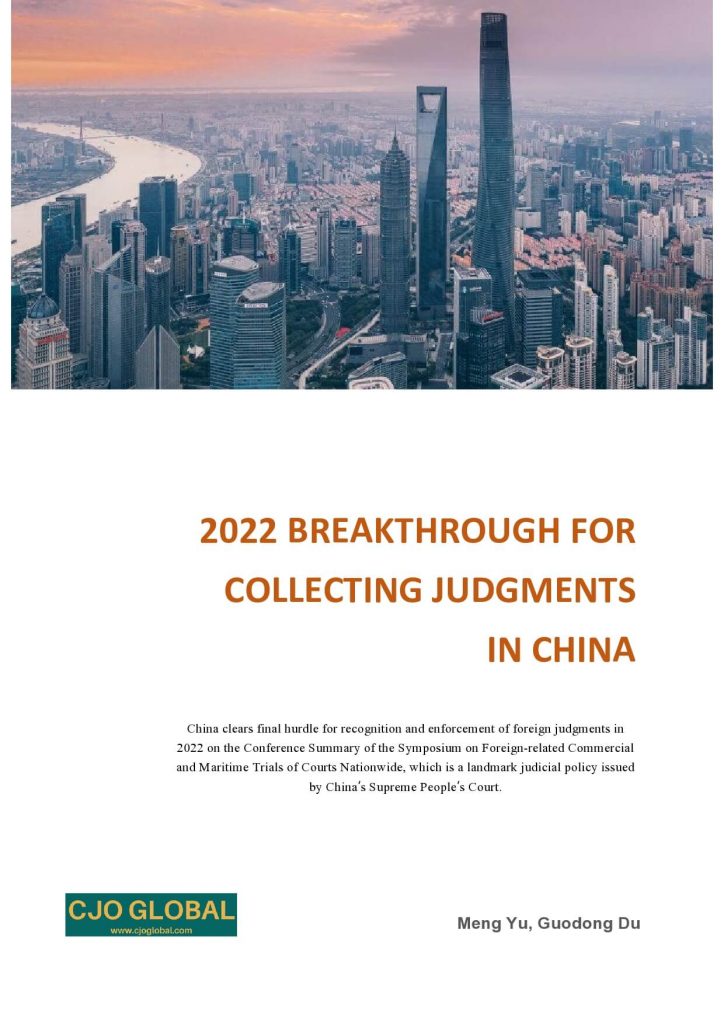Case Filing, Service of Process and Withdrawal of Application – Breakthrough for Collecting Judgments in China Series (X)
Key takeaways:
- The 2021 Conference Summary provides the rules on case filing, service of process and withdrawal of application in cases of the recognition and enforcement of foreign judgments in China.
- If the court finds that the application does not meet the case filing conditions, it will rule not to accept the case. If the court finds the situation after case acceptance, it will rule to dismiss the application. Both types of rulings may be subject to appeal.
- Chinese courts can serve the process by electronic means, as long as certain requirements are met.
Related Posts:
- China Issues Landmark Judicial Policy on Enforcement of Foreign Judgments – Breakthrough for Collecting Judgments in China Series (I)
- How Chinese Courts Review Applications for Enforcement of Foreign Judgments: Criteria and Scope of Application – Breakthrough for Collecting Judgments in China Series (II)
- How Chinese Courts Determine Reciprocity in Foreign Judgment Enforcement – Breakthrough for Collecting Judgments in China Series (III)
- How Chinese Courts Identify Foreign Judgments as Final and Conclusive? – Breakthrough for Collecting Judgments in China Series (IV)
- What Documents to Prepare for Enforcing Foreign Judgment in China – Breakthrough for Collecting Judgments in China Series (V)
- How to Write an Application for Enforcing Foreign Judgment in China – Breakthrough for Collecting Judgments in China Series (VI)
- Conditions for Enforcement of Foreign Judgments in China – Breakthrough for Collecting Judgments in China Series (VII)
- Where to File Application for Enforcing Foreign Judgments in China – Breakthrough for Collecting Judgments in China Series (VIII)
- Can Applicant Seek Interim Measures from Chinese Courts? – Breakthrough for Collecting Judgments in China Series (IX)
- Case Filing, Service of Process and Withdrawal of Application – Breakthrough for Collecting Judgments in China Series (X)
- How Chinese Courts Ensure Impartiality in Enforcing Foreign Judgments: Ex Ante Internal Approval and Ex Post Filing- Breakthrough for Collecting Judgments in China Series (XI)
China published a landmark judicial policy on the enforcement of foreign judgments in 2022, embarking on a new era for judgment collection in China.
The judicial policy is the “Conference Summary of the Symposium on Foreign-related Commercial and Maritime Trials of Courts Nationwide” (hereinafter the “2021 Conference Summary”, 全国法院涉外商事海事审判工作座谈会会议纪要) issued by the China’s Supreme People’s Court (SPC) on 31 Dec. 2021.
As part of the ‘Breakthrough for Collecting Judgments in China Series’, this post introduces Articles 37, 40, and 48 of the 2021 Conference Summary, which the rules on case filing, service of process, and withdrawal of application in cases of the recognition and enforcement of foreign judgments in China.
I. How do Chinese courts examine cases at case filing
Texts of the 2021 Conference Summary
Article 40 of the 2021 Conference Summary [Case Filing Examination]:
“If the applicant’s application does not meet the case filing conditions, the people’s court shall rule not to accept the case and explain the reasons for non-acceptance. If the case has been accepted, the people’s court shall rule to dismiss the application. If the party refuses to accept the dismissal, it may appeal. If, after the people’s court rules not to accept the case or to dismiss the application, the applicant applies again and meets the case filing conditions, the people’s court shall accept the case.”
Interpretations
1. What is the case filing examination
The Chinese court will, upon receiving the application filed by the applicant, first conduct a formality examination to determine the satisfaction of the case filing conditions.
2. What case filing conditions should be met
The Supreme People’s Court (SPC) has stipulated the case filing conditions of applying for judgment enforcement in the “Provisions on Several Issues Concerning the Enforcement of Judgments by People’s Courts (For Trial Implementation) (2020)”(Fa Shi [2020] No. 21) (hereinafter the “Provisions”,《关于人民法院执行工作若干问题的规定(试行)(2020)》(法释〔2020〕21号)). Although the Provisions is aimed at the enforcement of effective judgments, including domestic judgments and foreign judgments whose effectiveness has been recognized by Chinese courts, it is also of reference significance for determining the case filing conditions of applying for recognition and enforcement of foreign judgments.
Accordingly, the case filing conditions for an application for recognition and enforcement of a foreign judgment are as follows:
- The application form is in a standardized format with complete information.The foreign judgment is a legal document enforceable by Chinese courts enumerated in the 2021 Conference Summary;
- The foreign judgment has entered into force;
- If both the recognition and the enforcement of a foreign judgment are proposed at the same time, the foreign judgment shall contain the obligation to pay and to perform (for application for recognition of a foreign judgment only, such condition is not required);
- The applicant is the judgment creditor determined by the foreign judgment or its inheritor or successor to the rights thereof;
- The identity of the respondent is known and the respondent is the judgment debtor determined by the foreign judgment;
- The executable property of the respondent is known;
- The applicant applies within the statutory time limit;
- The respondent fails to perform its obligations within the time limit determined by the foreign judgment;
- The case falls under the jurisdiction of the receiving court; and
- The applicant submits the required application materials.
3. What will the court do if the case filing conditions are not met
If the court finds that the application does not meet the case filing conditions, it will rule not to accept the case. If the court finds the situation after case acceptance, it will rule to dismiss the application. Both types of rulings may be subject to appeal.
If, after the Chinese court rules not to accept the case or to dismiss the application, the applicant meets the case filing conditions, it may apply again. The court will accept the application and examine its satisfaction with the case filing conditions.
II. Service on the respondent
Texts of the 2021 Conference Summary
Article 37 of the 2021 Conference Summary [Service on the Respondent]:
“Where a party applies for recognition and enforcement of a foreign judgment or ruling, the people’s court shall list the other party as the respondent in the judgment. If both parties apply so, they shall be both listed as the applicant.
The people’s court shall serve a copy of the application on the respondent. The respondent shall submit its opinions within 15 days after the date of receipt of a copy thereof; if the respondent has no domicile within the territory of the People’s Republic of China, it shall submit its opinions within 30 days after the date of receipt of a copy thereof. The respondent’s failure to submit its opinions within the above-mentioned time limit shall not affect the examination by the people’s court.”
Interpretations
1. Who is the respondent
In a foreign judgment, the opposite party of the applicant is the respondent. If both parties apply for recognition, they shall be both listed as applicants.
2. How does the applicant serve the process on the respondent
The court will serve a copy of the application to the respondent at the address provided by the applicant. Therefore, it is advised that the applicant provide accurate contact information of the respondent.
If the respondent has no domicile in China, the Chinese court will serve the process in accordance with the pertinent bilateral treaty or the Hague Service Convention.
Chinese courts can also serve the process by electronic means, as long as the following requirements are met (Art. 11 of the 2021 Conference Summary):
(1) If the law of the respondent’s country does not prohibit electronic service, the Chinese court may serve the process by electronic means, unless otherwise prohibited by the international treaties concluded or acceded to by China.
(2) If the respondent’s country is a contracting state of the Hague Service Convention and declares its objection to service by mail thereunder, it shall be presumed that electronic service is not allowed. At this point, Chinese courts cannot serve the process by electronic means.
3. The respondent may submit its opinions within a prescribed time limit
The respondent shall submit its opinions within 15 days as of the date of receiving a copy of the application; if the respondent has no domicile in China, it shall submit its opinions within 30 days as of the date of receiving a copy thereof. The respondent’s failure to submit opinions within the above-mentioned time limit shall not affect the examination by the Chinese court.
III. Withdrawal of application
Texts of the 2021 Conference Summary
Article 48 of the 2021 Conference Summary [Handling of Withdrawal of Application]:
“The people’s court shall rule to allow the applicant’s request to withdraw the application after the people’s court has accepted the application for recognition and enforcement of a foreign judgment or ruling but not yet made a ruling.
Although the people’s court has ruled to allow the withdrawal of the application, the people’s court shall still accept the case if the applicant applies again and meets the case filing conditions.
If the applicant refuses to participate in the inquiry procedure without justified reasons, it shall be deemed as an automatic withdrawal of the application by the applicant.”
Interpretations
1. The applicant may withdraw its application
After the Chinese court has accepted the application for recognition and enforcement of a foreign judgment but not yet made a ruling, the applicant may request to withdraw the application, and the Chinese court may rule to allow the application accordingly.
2. Withdrawal of application shall not affect a re-application
Although the Chinese court has ruled to allow the withdrawal of the application, if the applicant applies again and meets the case filing conditions, the Chinese court shall accept the case.
3. The default of the applicant will be deemed as a withdrawal of application
If the applicant refuses to participate in the inquiry procedure organized by the Chinese court without justified reasons, the Chinese court may deem such default as an automatic withdrawal of the application by the applicant.
Do you need support in cross-border trade and debt collection? CJO Global's team can provide you with China-related cross-border trade risk management and debt collection services, including: (1) Trade Dispute Resolution (2) Debt Collection (3) Judgments and Awards Collection (4) Anti-Counterfeiting & IP Protection (5) Company Verification and Due Diligence (6) Trade Contract Drafting and Review If you need our services, or if you wish to share your story, you can contact our Client Manager: Susan Li (susan.li@yuanddu.com). If you want to know more about CJO Global, please click here. If you want to know more about CJO Global services, please click here. If you wish to read more CJO Global posts, please click here.










Pingback: How Chinese Courts Ensure Impartiality in Enforcing Foreign Judgments: Ex Ante Internal Approval and Ex Post Filing- Breakthrough for Collecting Judgments in China Series (XI) - CJO GLOBAL
Pingback: Can Applicant Seek Interim Measures from Chinese Courts? - Breakthrough for Collecting Judgments in China Series (IX) - CJO GLOBAL
Pingback: How Chinese Courts Determine Reciprocity in Foreign Judgment Enforcement - Breakthrough for Collecting Judgments in China Series (III) - CJO GLOBAL
Pingback: How Chinese Courts Review Applications for Enforcement of Foreign Judgments - Breakthrough for Collecting Judgments in China Series (II) - CJO GLOBAL
Pingback: What Documents to Prepare for Enforcing Foreign Judgment in China - Breakthrough for Collecting Judgments in China Series (V) - CJO GLOBAL
Pingback: How to Write an Application for Enforcing Foreign Judgment in China - Breakthrough for Collecting Judgments in China Series (VI) - CJO GLOBAL
Pingback: Conditions for Enforcement of Foreign Judgments in China - Breakthrough for Collecting Judgments in China Series (VII) - CJO GLOBAL